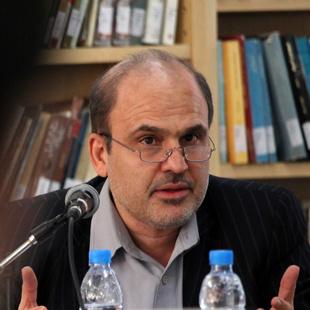Democracy is Not a Western Value Anymore

IRD: Hamidreza Jalaeipour, arguing the roots of popular movements in the Muslim and Northern African countries, emphasized that we can draw three lessons from the recent events and developments in the region. The first not-so-complicated lesson is that democracy is not considered as a Western value or as imported values.
He continued, “It seems that the regional governments that to some extent are familiar with those democratic mechanisms have faced fewer challenges. Indeed, where there is a democratic mechanism, problems and protests vanish quickly; where it is weak, rebellion occurs, where there is no democracy revolution breaks out, and finally, if resistance is mounted like in Libya, there will be a civil war.
The Tehran University sociology professor, referring to the Tea Party in the US congressional elections, said, "We saw that the political current wanted to put forward its demands through a social mass gathering against the Democrats, however it did not result in affecting the US system as a whole but did result in conservatives entering Congress. Over one and a half million people staged protests in Paris, but that did not affect the political system; a law was passed and now Sarkozy is to set to not to lose the next election. The status of thousands of protests in Britain is the same. The main reason for the stability of the systems is the circulating mechanism. In Turkey, a major demographic challenge was posed between the supporters of secularism and the Islamist advocates the AKP, but it did not cause an acute crisis or revolution because the secular Turkish army had submitted to democracy. Today, Turkey is the winner in the region: it exports millions of dollars of goods to Iran, bans Iranian aircraft, and plays a role in Libya and Egypt.
Pointing out that democracy in Egypt and Tunisia did not work well, and that was why there was a quiet revolution in these countries, he added, "Of course I'm not optimistic enough to say that democracy in both those countries will be surely established. But we saw that Libyan officials did not follow Ben Ali and Mubarak, and despite the obvious experiences in their neighborhood, they were allowed to remain in power as long as they suppressed the people. Therefore, it is a civil war in Libya, but not a revolution.
Stating that it is necessary to take lessons from these developments, Jalaeipour added, "The first lesson is that if democracy can work well, protests lead to reforms and on a lower level, to revolution. The second lesson is that it is common in some countries of this region that democracy does not bring security and stability, and only authoritarianism works.
Posing the question why authoritarianism had not worked in Tunisia and Egypt and was not helpful to authorities, he said, "the Egyptian government is a successful authoritarian one. Millions of tourists visit Egypt yearly and even Israelis’ visits have increased the country's revenues. But why was Mubarak overthrown? Why is Libya in the state it is after it has used tanks and fighter aircraft? And what happened so that authoritarianism failed? The first reason is that authoritarianism lasts in societies with widespread hunger, disease and panic. For example, Reza Khan’s totalitarian regime worked in Iran.”
Jalaeipour added in this regard, "In the 21st century, there is no longer such a situation: people’s fear revives authoritarianism, but in this century, people are no longer afraid. Communities move toward crystallization. Authoritarianism lasts when people are in fear. Apart from fear, repression and censorship is needed for authoritarianism. If people understand the events, they do not believe the rulers and the structure becomes loose. The Egyptian regime was powerful but it was overthrown. Even the superpowers are afraid of authoritarian regimes, because under their umbrella terrorism grows.
Referring to the unpredictability of the revolution, he added: “to explain the revolutionary conditions, we have anticipations, but no theory for revolution. However it seems that we should learn from the living experience. Thus, it is good to know its reason and the meaning.
Finally, Jalaeipour stipulated that “in all societies that have recently undergone a revolution, there were provoking and stimulating factors. It does not matter whether the one who self-immolated instigated the incident, but the most important thing is the cause. Usually, when the lower class protests the middle class resorts to the government and seeks safety but in Tunisia and Egypt, the lower class was unhappy and the middle class raised objections and followed them. It cannot be said that since Turkey is secular it did not change; Egypt was secular too, and Ben Ali was the most secular of the Arab rulers. The issue is that Turkey enjoys democracy, and democracy improves the situation of secularists, Islamists, ethnic groups, etc., and prevents dissolution of governments.

